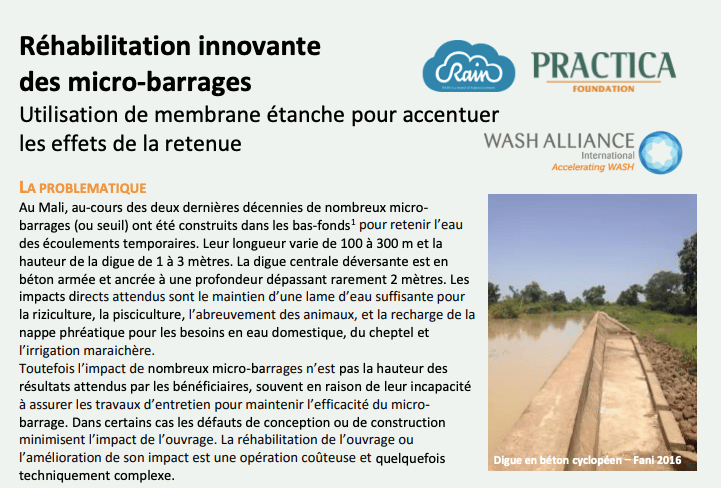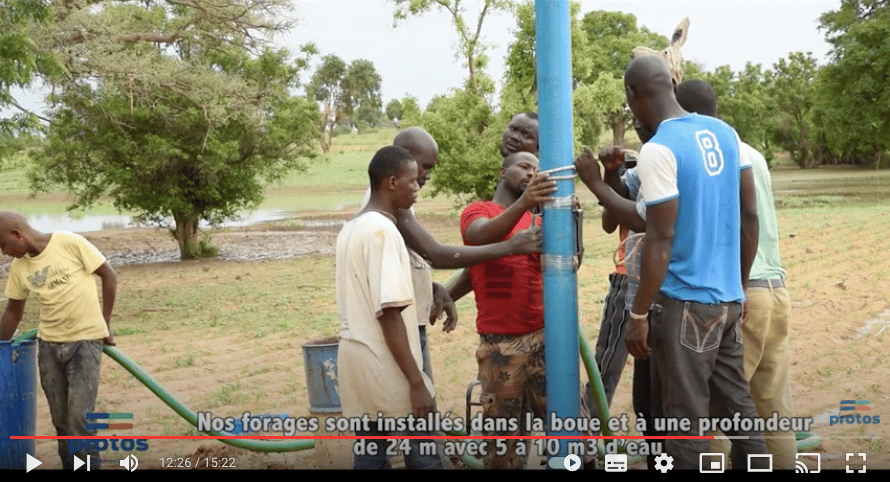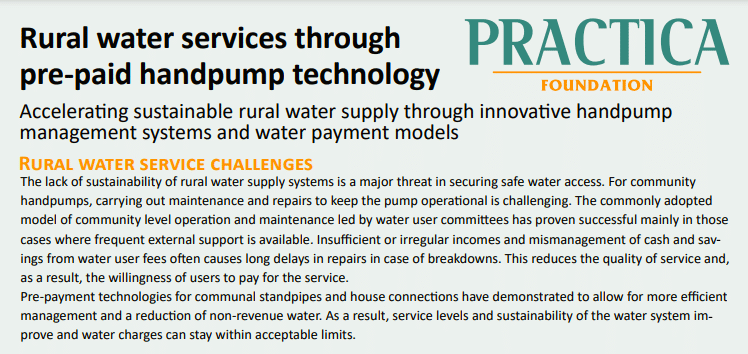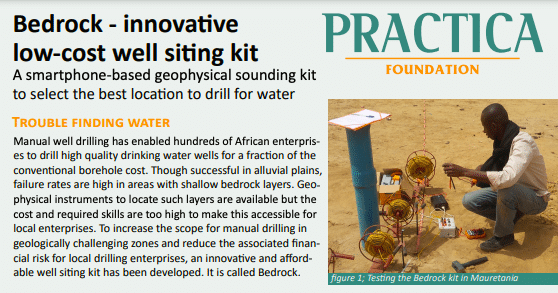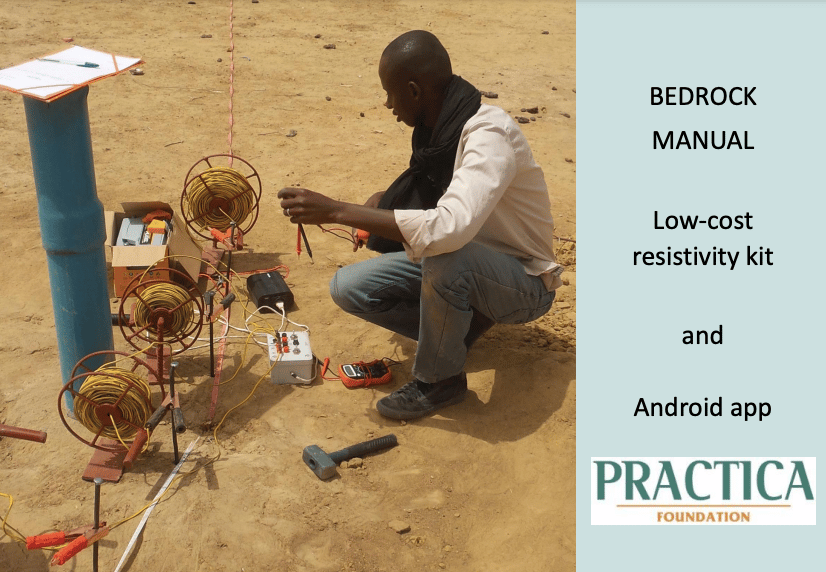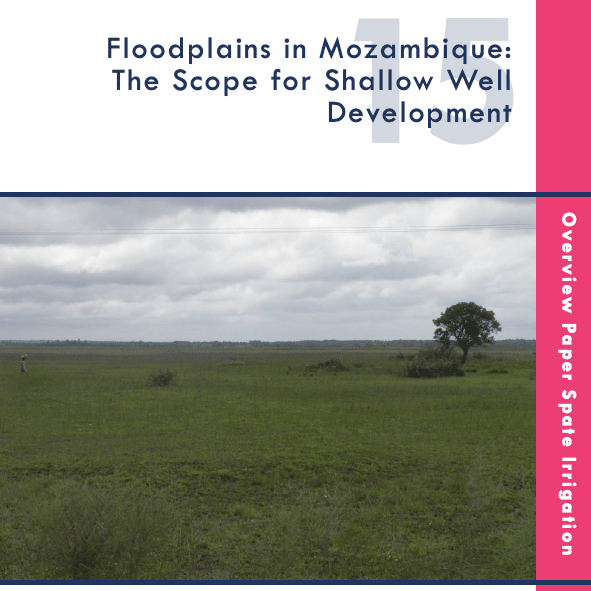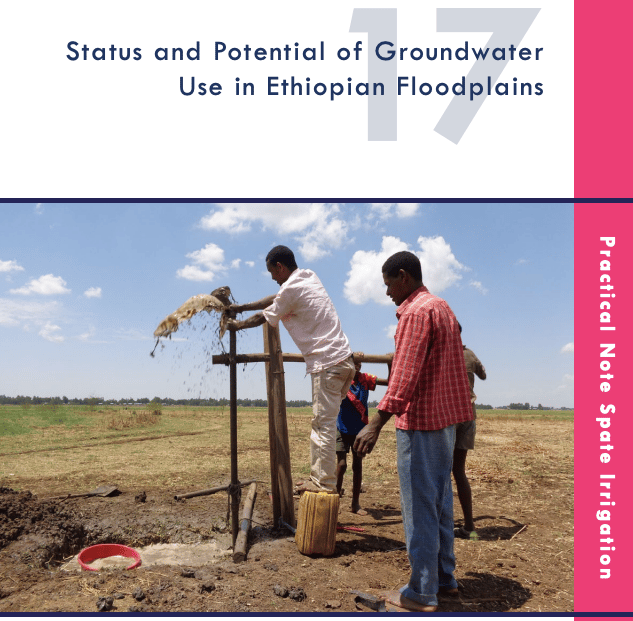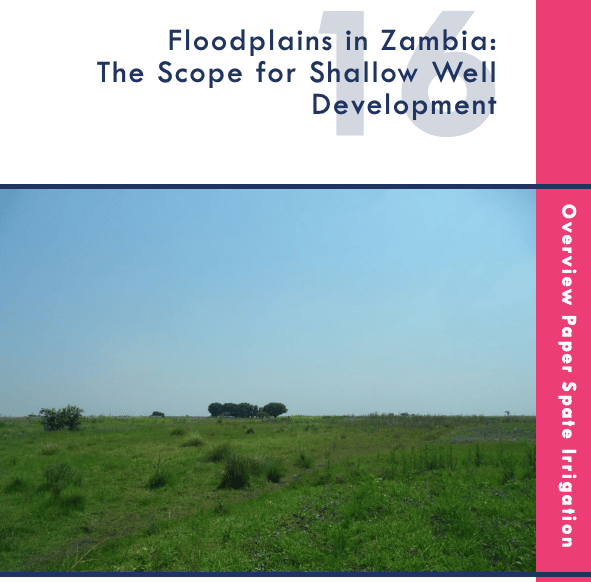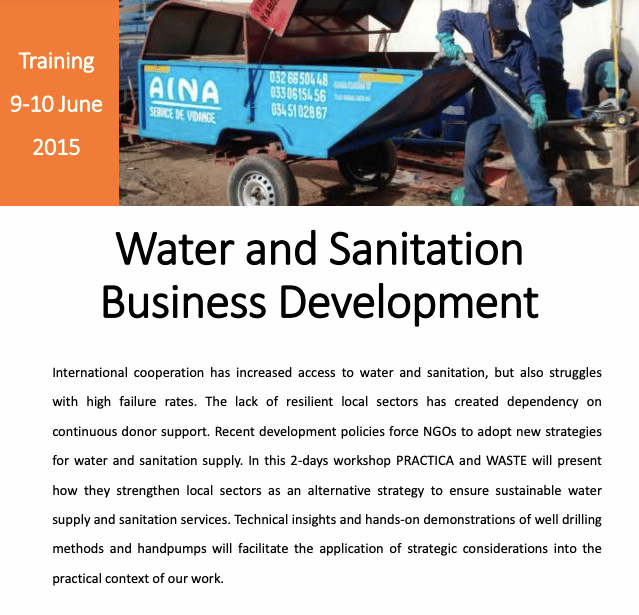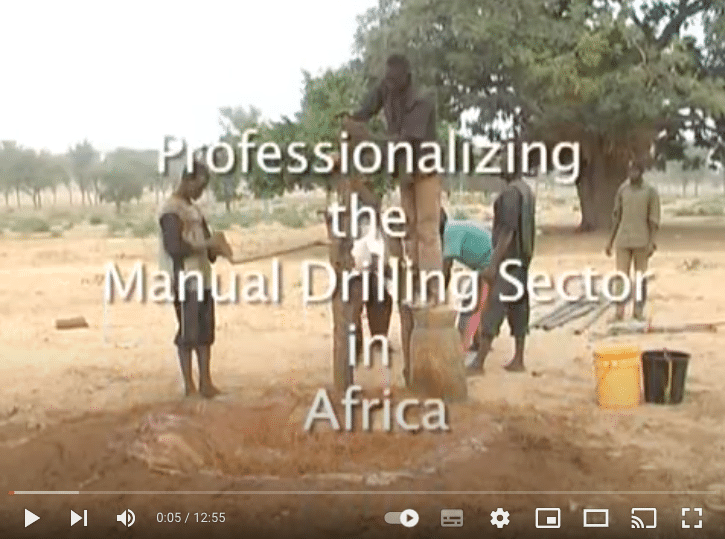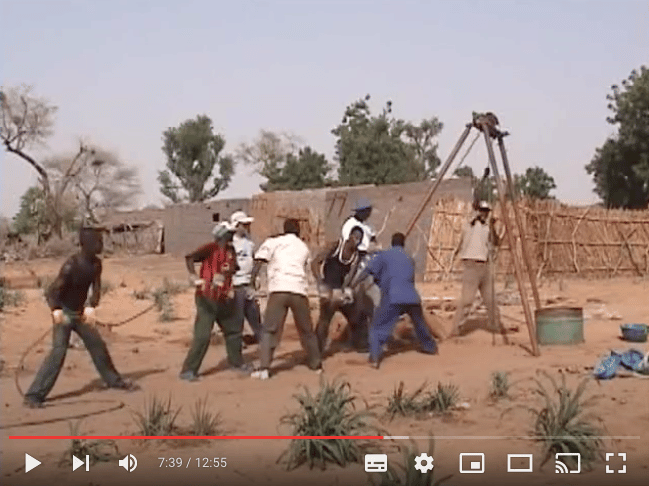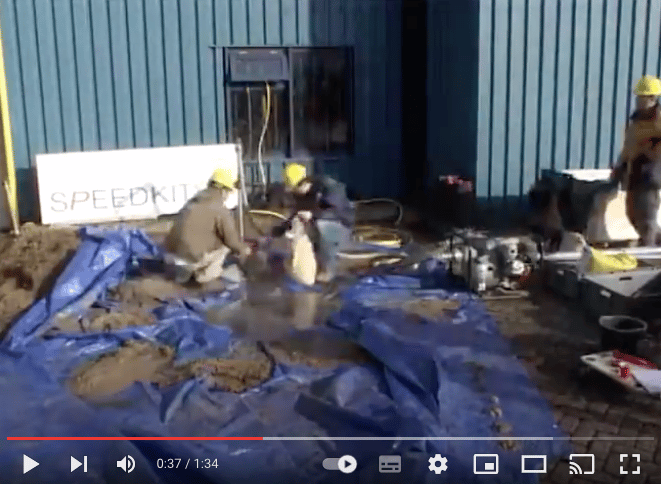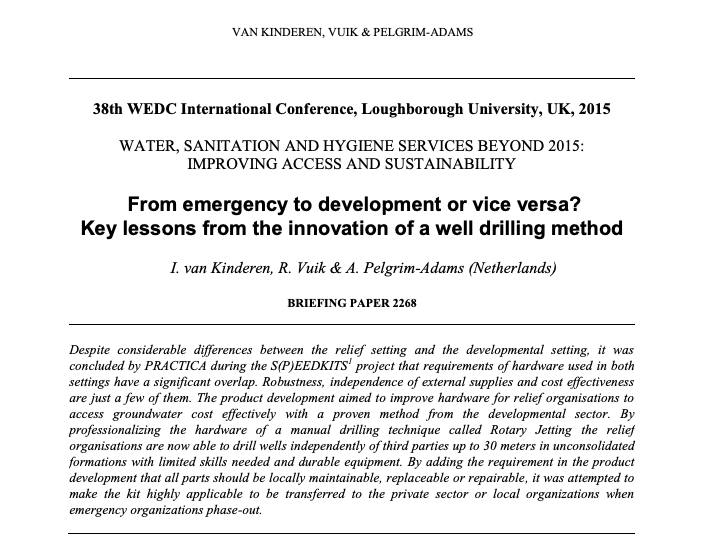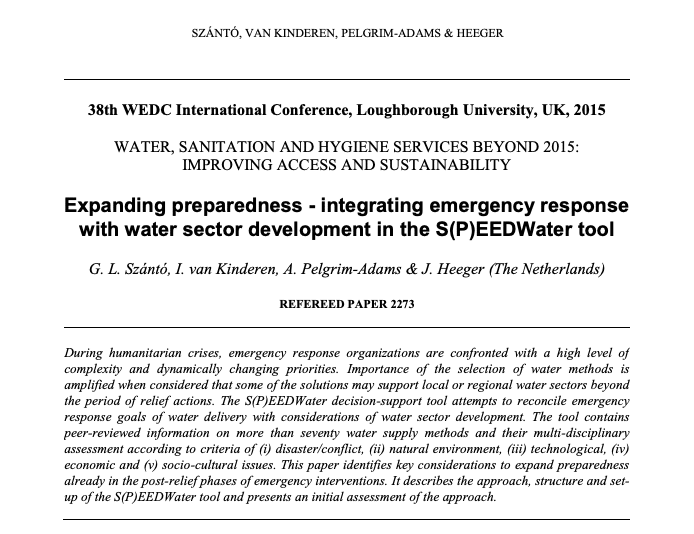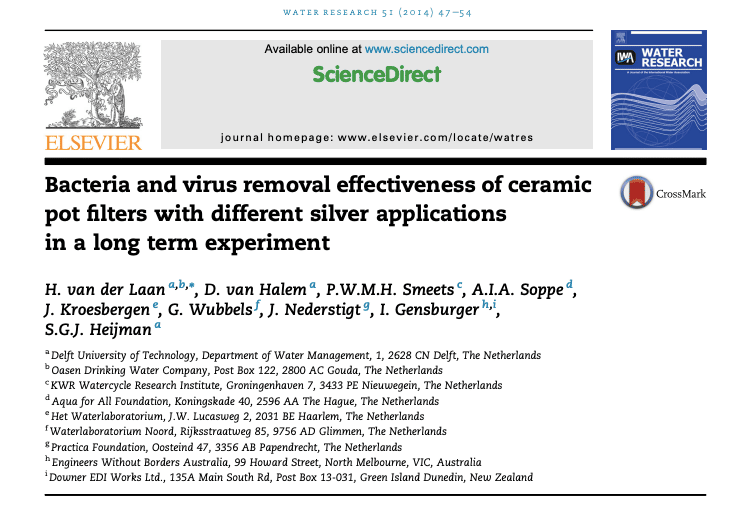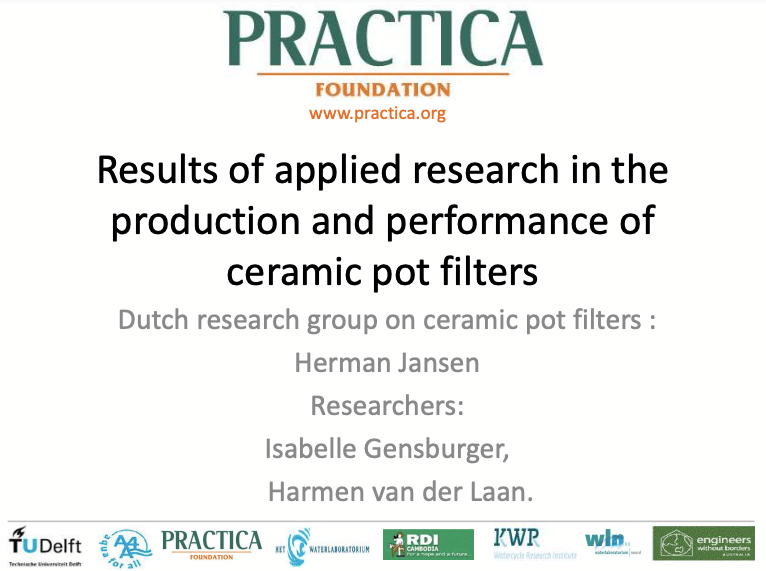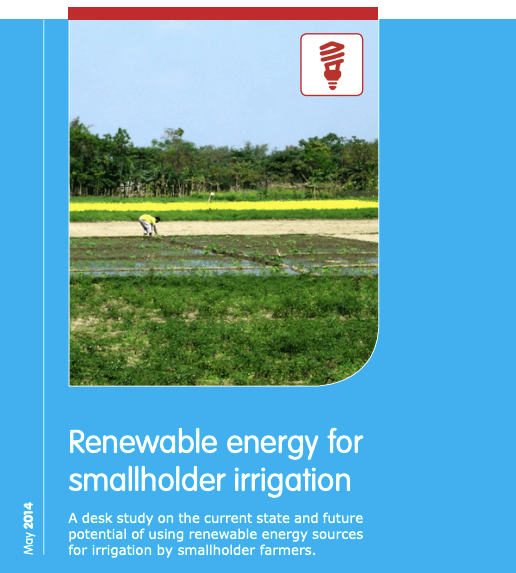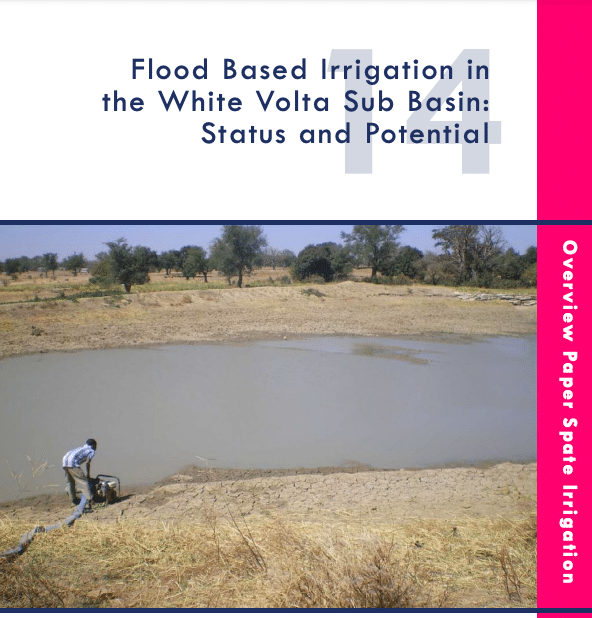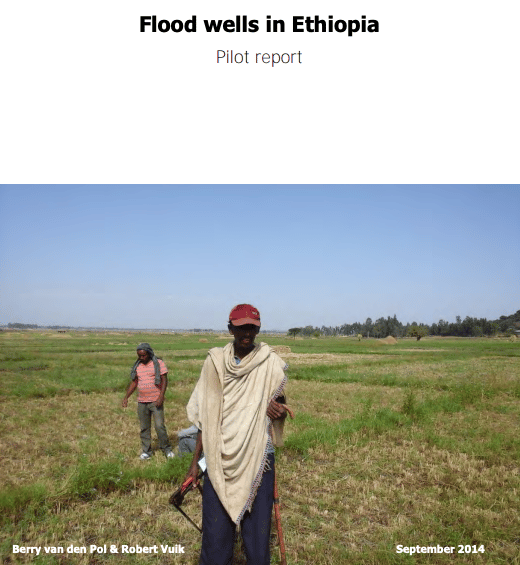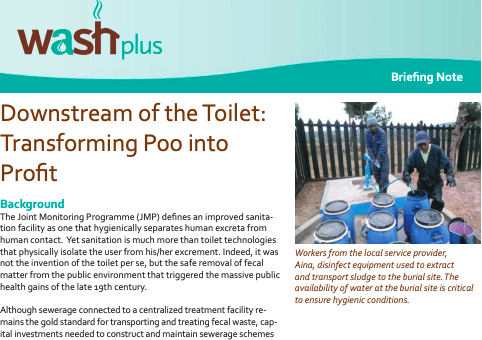Our publications
Resources produced during our past projects are accessible here.
For more than 10 years, we have capitalised documents on groundwater development, irrigation, drinking water supply and sanitation. You can find lessons learnt from the field, project reports, technical sheets, (training) manuals, videos, etc.
Check out and share the information you are interested in with the rest of the sector in order to support local enterprises and strengthen their technical and business skills.
Innovative rehabilitation of micro-dams
In the majority of cases, micro-dams are built on permeable ground, in particular to contribute to the recharge of the groundwater. To improve their impact, it is necessary to limit or slow down the longitudinal flow of the aquifer. Therefore, the deeper the foundations, the more water underground is retained. The use of a waterproof membrane (geotextile, PVC liner) along the entire length of the dike buried to a depth of 4 meters promotes the storage of groundwater over a longer great duration. This watertight wall prevents the creation of a vacuum (fox hydraulic) under the dike and its foundations caused by entrainment of particles that can destabilize the structure or create major leaks.
Impact of manual drilling in Mali
The use of manual drilling techniques, implemented by small businesses, is a sustainable and adapted to the context, alternative to mechanical and expensive techniques. To date, Protos Mali and Practica have trained companies on manual drilling techniques, metal workshops on the manufacture of equipment, and developed an operational guide for implementing the manual drilling technique. These activities were funded by UNICEF.
Rural water services through pre-paid handpumps
Accelerating sustainable rural water supply through innovative handpump management systems and water payment models. The innovation developed by PRACTICA lies in the application of a similar model to community handpumps. This entails shifting from community-owned and managed handpumps to a service contract with a (semi)private operator. Payments will be done per volume of water consumed.
This poster was presented during the 7th RWSN forum from 29 Nov – 2 Dec 2016 in Abidjan.
Bedrock – innovative low-cost well siting kit
A smartphone-based geophysical sounding kit to select the best location to drill for water. The Bedrock kit uses a Vertical Electrical Sounding (VES) principle to assess soil resistivity at various depths and generate a corresponding soil profile. The hardware is based on a design by Clark and Page (2011) and further developed by PRACTICA.
This poster presented during the 7th RWSN forum organised from 29 Nov – 2 Dec 2016 in Abidjan.
Bedrock – Low-cost resistivity kit & Android app
This manual explains the operation of a low-cost vertical electrical sounding (VES) kit and the interpretation of measurements using the Bedrock app. The technology has been designed by Clark and Page (2011) and was adapted by PRACTICA Foundation to meet the requirements of manual drilling teams.
Toutes les données des sondages électriques archivées par l’application Bedrock sont disponible ici.
Veuillez noter que la base de données est encore en phase de développement.
Flood plains in Mozambique: The Scope for Shallow Well Development
Socio-economically the scope for flood wells is highly variable, depending on the local farming systems, current access to water, common livelihood strategies and market access. The largest scope has been identified in the floodplains at the Northern side of the lower Zambezi River. Remote and coastal zones mostly showed a limited scope as the majority of its inhabitants are not focused on cash crop production.
Status and Potential of Groundwater Use in Ethiopian Floodplains
Shallow groundwater development through lowcost technologies is a key asset to increase the productivity of smallholder farms in floodplains. The study demonstrates current initiatives of shallow groundwater use for water supply and irrigation, and reveals a scope for upscaling appropriate technologies.
Floodplains in Zambia: The Scope for Shallow Well Development
This paper looks at the potential of flood wells development in the floodplains of Zambia. It starts with an overview of the Zambian water resources (chapter 2), then it gives a detailed overview of the hydrological system, land use and agricultural production in the floodplains (chapter 3), analyses the geo-hydrological suitability of the floodplains for drilling (chapter 4), describe the stakeholders involved (chapter 5) and concludes with analyzing the feasibility of the floodplains to implement flood wells.
Business Development Training 9-10 June 2015
Information sheet on a business development training organised by WASTE and Practica in the Netherlands, June 2015 on the topic: Water and Sanitation Business Development. 8 sessions organised within 2 days cover the topics of the role of NGOs, manual drilling, water supply, sanitation, and markets. The goal is to increase awareness about having resilient and empowered local organisations and hopefully therefore reduce the failure rates of water and sanitation systems.
Advocacy for manual drilling
Promotional video for manual drilling made after the successful program funded by UNICEF and implemented by Practica to professionalise this sector. Many opportunities for manual drilling would allow a low-cost access to groundwater for drinking or productive use.
Professionalisation of manual drilling
Manual well drilling offers a range of low-cost techniques that can be used by local enterprises to drill wells in remote areas. This video shows how Unicef, EnterpriseWorks and Practica Foundation have built professional drilling sectors throughout Africa. Several manual drilling techniques as well as the impact of the project and the methods used to build the capacity of local enterprises are presented.
Installation & Use – Emergency Rotary Jetting Kit
This time lapse video shows the drilling and installation of a well using the emergency jetting kit that we developed. It explains the different steps of the manual drilling method while showing how it is made in practice. You can learn more about the rotary jetting kit via this page.
Relief VS development lessons from well drilling
The case of well drilling during the S(P)EEDKITS project is used to illustrate the overlap between relief and development settings despite considerable differences in context and goals.
This paper was written by three Practica experts and presented at the 38th WEDC International Conference, Loughborough University, UK, 2015: Water, Sanitation and Hygiene Services beyond 2015: Improving Access and Sustainability
http://www.wedcconference.co.uk/
Expanding preparedness – The S(P)EED Water Tool
The S(P)EED decision support tool attempts to reconcile emergency response goals of water delivery with considerations of the water sector development.
This paper, written by three Practica experts, was presented at the 38th WEDC International Conference, Loughborough University, UK, 2015: Water, Sanitation and Hygiene Services beyond 2015: Improving Access and Sustainability
http://www.wedcconference.co.uk/
Bacteria and virus removal effectiveness of ceramic pot filters with different silver applications in a long term experiment
The aim of this study was to determine the role of silver during the filtration and subsequent storage. Twenty-two CPFs with three different silver applications (non, only outside and both sides) were compared in a long-term loading experiment with
Escherichia coli (K12 and WR1) and MS2 bacteriophages in natural challenge water under highly controlled laboratory circumstances.
Results of applied research in the production and performance of ceramic pot filters – presentation
Research on ceramic pot filter production and performance on the removal of bacteria and viruses.
Renewable energy for smallholder irrigation
This study summarizes experiences using Renewable Energy (RE) water pumping options as irrigation by smallholder farmers in developing countries. It includes an overview of conventional technologies (petrol and diesel pumpsets),along with an
inventory of RE alternatives (windpumps, solar Photo Voltaic[PV] pumps, solar thermal pumps and biogas). Other technologies included in this study are hydram pumps, biomass, bio-fuel and hybrid systems, which all have limited potential for smallholder
irrigation.
Flood Based Irrigation in the White Volta Sub Basin: Status and Potential
In this paper particularly the water management practices of the White Volta sub basin is discussed, due to its central location. The findings imply that in order to achieve high impact, irrigation development in sub-Saharan Africa should consider the economic status of the users and their ability to make the best out of the technology in terms of productivity. Moreover, technologies that give farmers full control over the water should be preferred. Most of the recent irrigation technologies identified in the White Volta sub-basin are indigenous and locally managed. Farmers in the sub-basin have successfully managed these technologies because they are simple and relatively inexpensive.
Flood wells in Ethiopia – Pilot Report
Flood wells are an innovative concept that could provide smallholder farmers in floodplains with private access to irrigation water. This could increase the productivity of floodplains drastically, as its current use is only marginal while its potential for cash crop production is enormous. Contrary to conventional hand-dug wells, flood wells do not collapse in the rainy season and allow farmers to irrigate right after the floods recede. The concept could become of great value to increase food security and combat poverty in floodplains throughout Africa.
Downstream of the Toilet: Transforming Poo into Profit
A briefing note. Current trends necessitate the emergence of alternative service delivery options to manage fecal sludge downstream of the toilet in ways that are less resource intensive, yet environmentally safe and economically sustainable for resource-poor environments.

